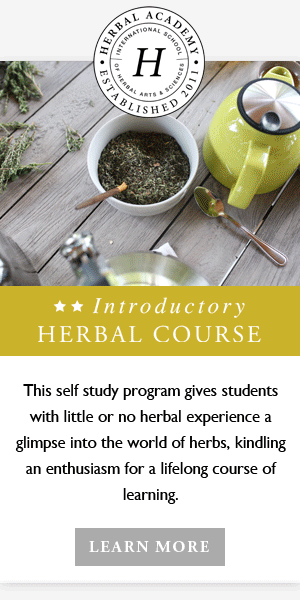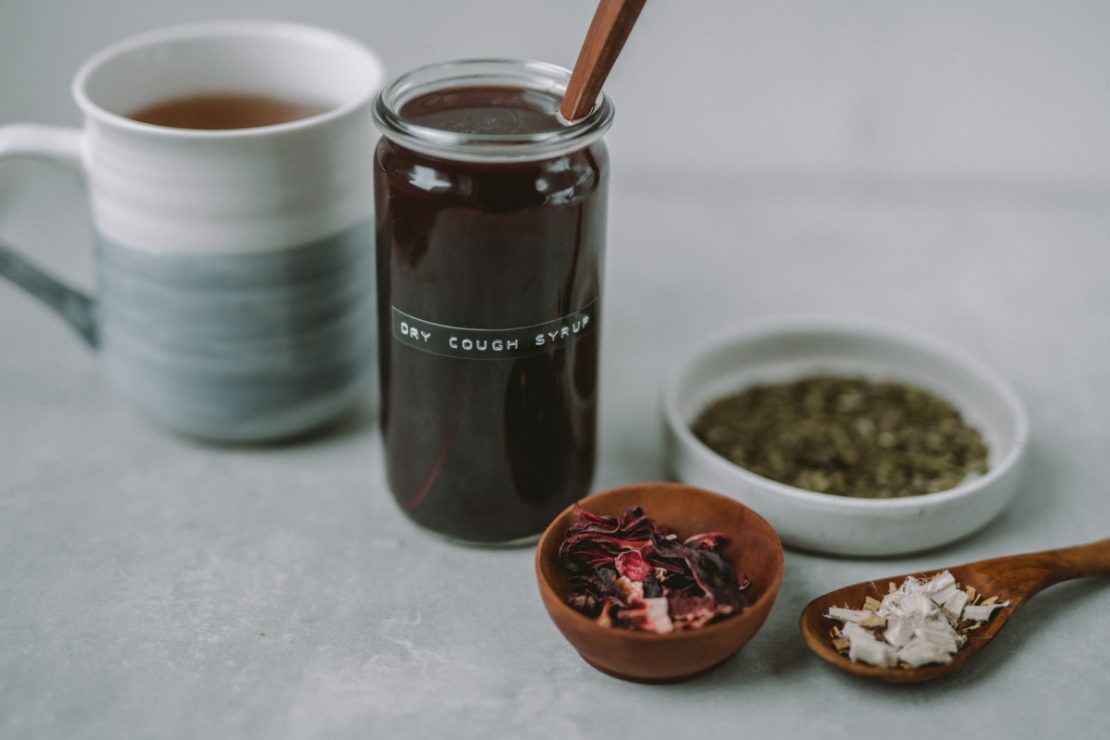
Herbal Cough Syrup Recipe for a Dry Cough
A dry unproductive cough can be caused by irritation such as dry air, smoke, allergens, and pollution, or develop during a respiratory infection. Worst of all it can be really uncomfortable, disrupting sleep, work, school, travel, and other activities, and can cause a headache or a sore throat that lasts. A dry cough and sore throat will perpetuate each other. For soothing support, I will share with you how to easily prepare your own homemade cough syrup recipe, including moistening, inflammation-soothing, and demulcent herbs.
These herbs assist in a dry cough when natural protections like healthy mucosal production are lacking and the throat feels dry and scratchy. So, instead of suppressing the coughing, this herbal cough syrup is helping the irritation causing a cough so the coughing fits aren’t so painful and become more productive. The demulcent quality can also support you in many cases!
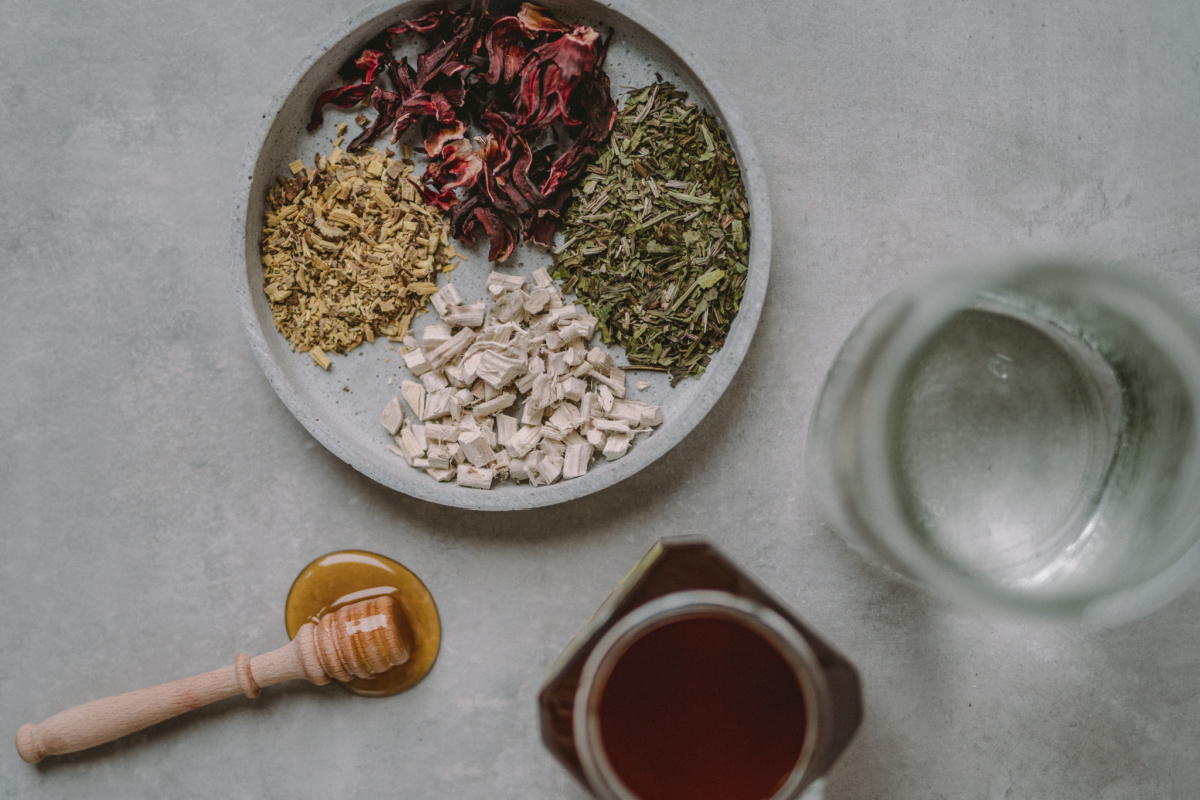
Herbal Allies For A Dry Cough
Licorice (Glycyrrhiza glabra) root, marshmallow (Althaea officinalis) root, plantain (Plantago spp.) leaf and seed, and hibiscus (Hibiscus sabdariffa) calyces are all demulcents. The slippery nature of demulcents contributes to and influences the quality of mucus even when it has become sticky, dry, and stuck, helping to unstick and thin the natural mucosal layer, making it more functional and protective. This effectively makes demulcents expectorant too! This is particularly supportive in a dry cough or when there is an urge to cough but no cough is present. In these cases, mucus may be present though it is too thick, hardened, and inert to elicit a cough—or too thick and sticky to expel effectively by coughing. These herbs can also be used to help the impact of airborne allergens and other irritants, such as smoke or pollution that often occurs in densely populated areas.
Licorice – Glycyrrhiza glabra (root)
The Genus name, Glycyrrhiza, is of Greek origin, with glykys meaning “sweet” and rhiza meaning “root”. A well-suited name for this herb!
Licorice is a sweet, neutral, and moist root. Polysaccharides in the root contribute to its demulcent quality. Licorice also has anti-inflammatory properties making it ideal for afflictions that are hot and dry, such as sore throats related to bronchitis and dry coughs.
Licorice may also act as a broad-spectrum antiviral that either prevents a virus from entering cells, directly assists during times of a virus through a variety of mechanisms (e.g., stops replication, inhibits growth), or assists the immune system to attack a virus.
Glycyrrhizin, its most noted antiviral constituent is also 50 times sweeter than sugar and gives licorice its sweet taste. (Buhner, 2013)
Safety: Licorice should not be taken long-term (more than 4-6 weeks) or in high doses (Buhner, 2013). Licorice can induce a drop in potassium, leading to high blood pressure, and weakness. Those with high blood pressure, heart, liver, and kidney disease, diabetes, and pregnant women should not use whole licorice.
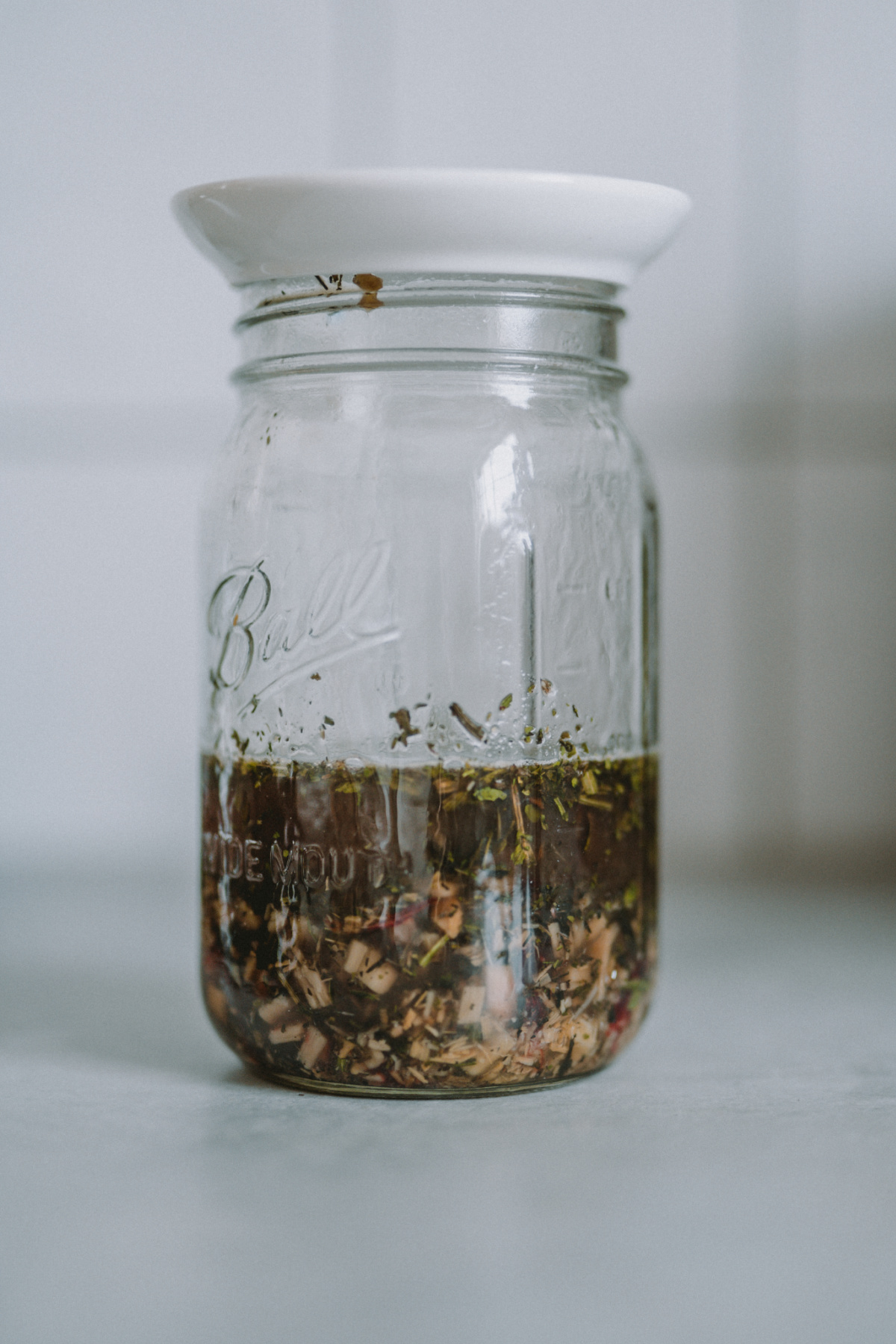
Marshmallow Root – Althaea officinalis (root)
The demulcent, diuretic, anti-inflammatory, expectorant, and emollient properties of marshmallow have long been in use for inflammation and sore throats (Whelan, n.d.). Nowadays herbalists still value this demulcent for supporting mucosal membranes. Additionally, the German Commission E, a scientific federal medical advisory board, has approved marshmallow root for oral and pharyngeal mucosa irritation and dry cough (Hoffmann, 2003).
Plantain – Plantago spp. (esp. P. lanceolata and P. major) (leaf)
This seemingly lowly little weed, ubiquitous in disturbed and compacted soils around the world, has a surprisingly broad range of uses! Among these many uses, plantain is a powerful ally for lung health, helping inflamed and irritated airways (Gray, 2011).
Hibiscus – Hibiscus sabdariffa (calyces)
The calyces of the luscious hibiscus plant are both astringent and demulcent, making it juicy and yet tonifying, supporting the functions of our natural barriers in a balanced way.
,.
Besides that, it comes with a rich supply of antioxidants, including polyphenols, rutin, and anthocyanins, and has a lovely fruity taste, therefore rounding out the syrup recipe perfectly (Groves, 2016).
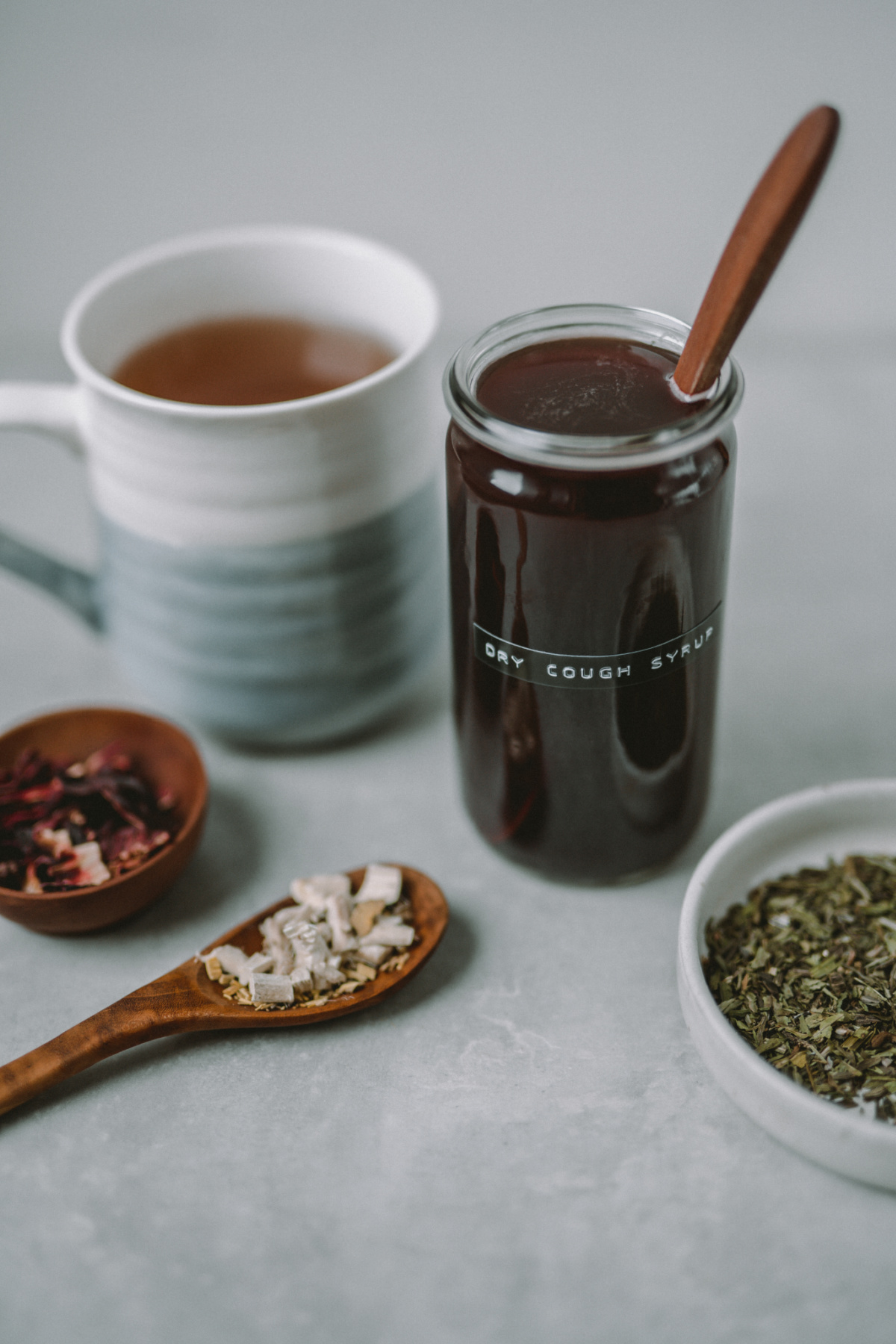
Homemade Cough Syrup for a Dry Cough
An herbal syrup is prepared by combining a concentrated decoction and/or infusion with honey. The honey works well for any kind of cough and increases the shelf life of the decoction. Also, honey increases the palatability of less tasty herbs. Children especially find syrups to be delicious!
2 tablespoons licorice (Glycyrrhiza glabra) root, dried
2 tablespoons marshmallow (Althaea officinalis) root, dried
2 tablespoons plantain (Plantago spp. (esp. P. lanceolata and P. major) leaf/ seeds, dried or fresh
2 tablespoons hibiscus (Hibiscus sabdariffa) calyces, dried
1 quart of water
1 cup raw, local honey
- Grind the herbs in a mortar and pestle.
- Prepare a concentrated decoction with the licorice and marshmallow root:
Combine the dried roots with a quart of water in a saucepan as follows.
Bring to a simmer and cook gently until the liquid volume reduces by half.
Keep an eye on the decoction to ensure it stays at a gentle simmer and be sure to remove it from the heat before the mixture becomes too thick or scorches. - Prepare an infusion with the plantain and hibiscus, using the finished root decoction (Should be about 1-2 cups): Pour the hot, strained decoction over the plantain leaves and hibiscus calyces.
Steep for at least 1 hour though not more than 8 hours. - Strain with a tea strainer, cheesecloth, or French press and return the liquid to the saucepan.
- Add the honey to the liquid in your saucepan.
- Warm the mixture just slightly to enable the liquid and honey to mix.
(not heating above 110 degrees Fahrenheit) - Transfer syrup into a clean, dry, sterilized glass bottle(s) or jar(s) (ideally, a dark-colored jar or bottle to protect from light exposure) using a sterilized funnel.
- Label and store in the refrigerator.
To Use: Take 1 tablespoon every 4 hours for adults, 1 teaspoon every 4 hours for older children.
Shelf Life: Several weeks, refrigerated
This delicious sweet syrup makes a great addition to many beverages or foods. Or, it is tasty enough to be taken on its own. Enjoy this herbal cough syrup with a warm cup of tea, or in sparkling water or desserts—get creative here!
Being Prepared For The Allergy Season
Even if you feel balanced in the present, it’s always best to prepare as much as you can in advance so you feel supported through all of the challenges the allergy season ahead can bring. This syrup containing demulcent herbs is just wonderful for soothing throat tissues during a dry cough or sore throat. Also, consider making a batch ahead of time if you plan on spending time in an area that is heavy with pollutants or other airborne irritants.
Be sure to also check out our Homemade Cough Syrup for a Wet Cough!
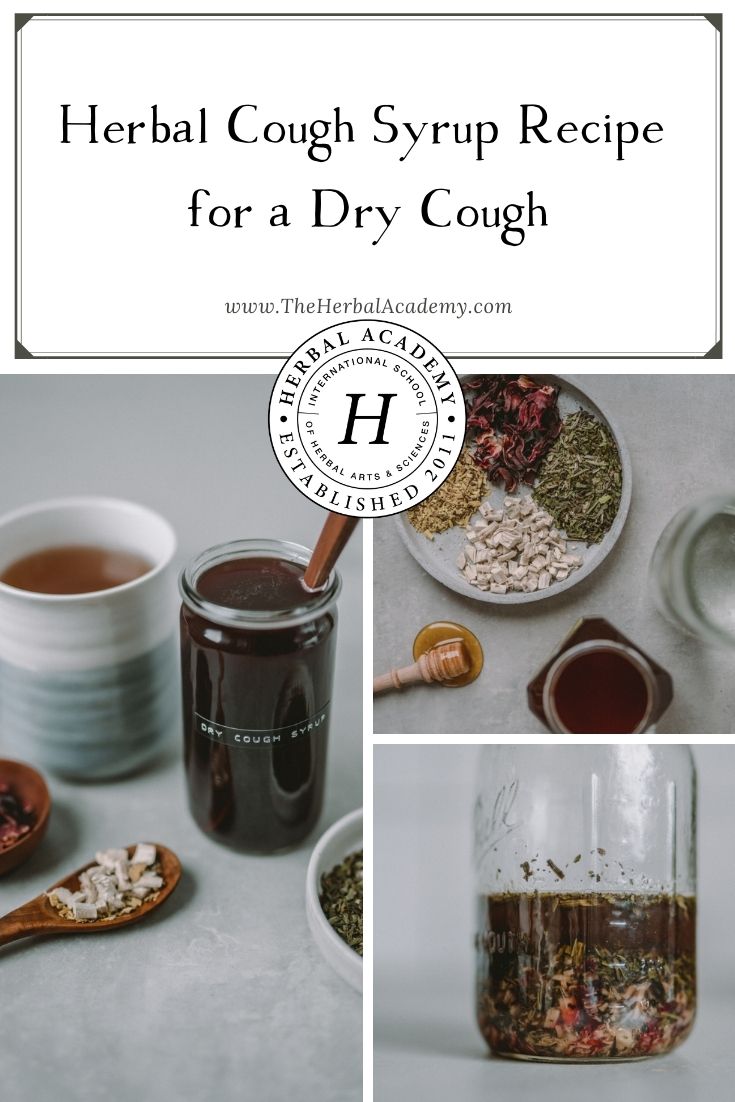
REFERENCES
Buhner, S. (2013). Herbal antivirals. North Adams, MA: Storey Publishing.
Gray, B. (2011). The boreal herbal: Wild food and medicine plants of the North. Whitehorse, YK: Aroma Borealis Press.
Groves, M. (2016). Body into balance. North Adams, MA: Storey Publishing
Hoffmann, D. (2003). Medical herbalism. Rochester, VT: Healing Arts Press
Whelan, R. (n.d.). Marshmallow [Online Database]. Retrieved from http://www.rjwhelan.co.nz/herbs%20A-Z/marshmallow.html

